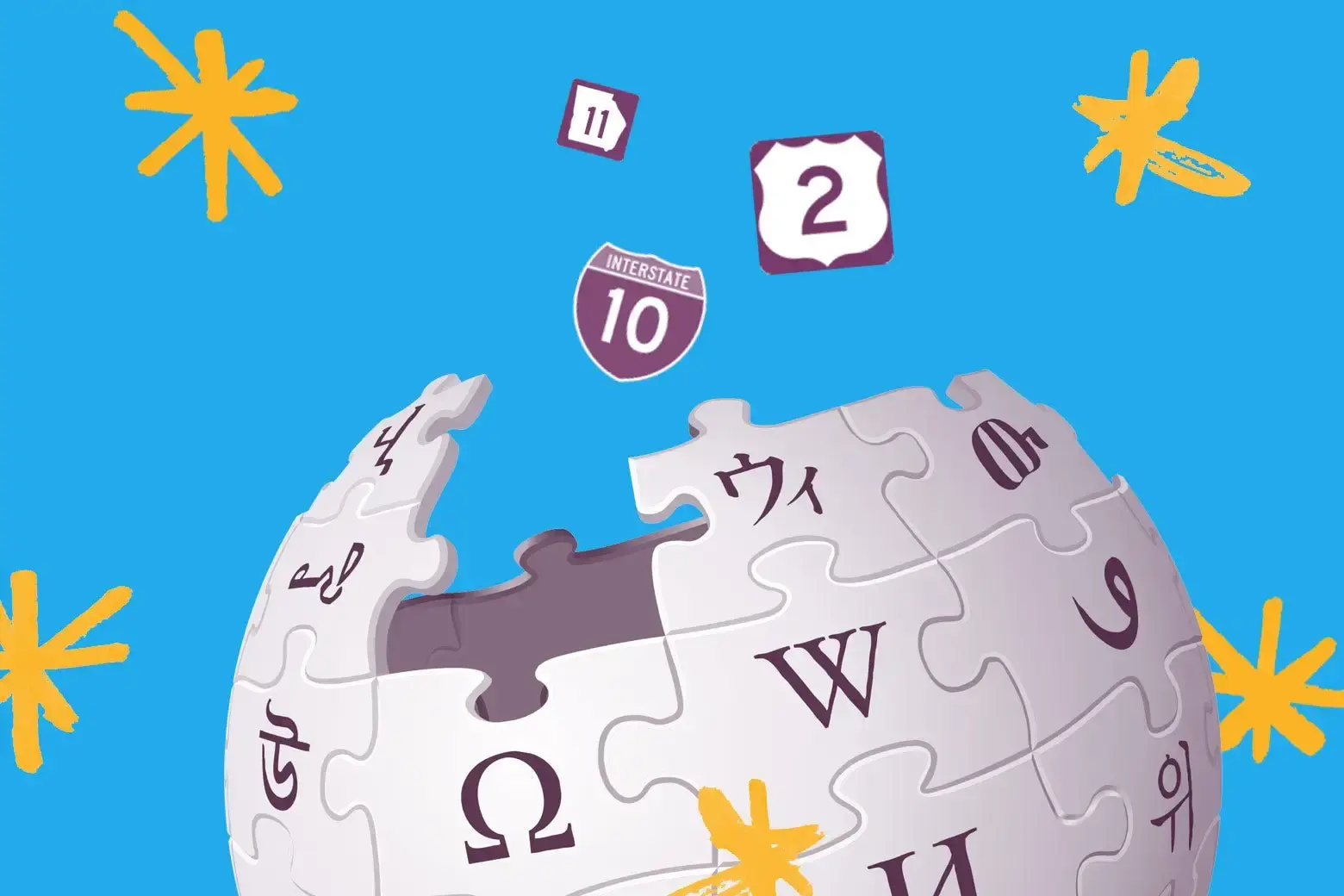Not sure technology is the best place to put this…any suggestions for a cross post?
A volunteer editor seeking to contribute content to the page might use information found on the West Virginia Department of Transportation’s website as a reference source. However, policy sticklers are likely to deny this usage because DOT is a primary source for highways (directly involved in the subject matter). According to the site’s policies, Wikipedia should be based mainly on reliable secondary sources, such as newspapers.
That is a bit silly to be honest
It’s also rather inaccurate. One can use a primary source like the DOT for information to add to an article. It’s just that a primary source like that doesn’t contribute to general notability and importance of the subject matter. The subject needs to be shown to have relevance that has been covered in other forms than just primary sources.
Yeah, alternatives for USRoads editors were proposed such as editing on Wikidata (on which the notability criteria is basically just “you can prove online that it exists”) and having them contribute on large list articles instead of separate articles for each roads. They took none of them.
Returning to the example of West Virginia Route 891: An easy way to support the statement that this highway runs east–west is to reference a map that shows it going that direction; however, citing such a map is considered “original research” by some of Wikipedia’s most hardcore policy enforcers.
Every single person undoing an edit on these grounds should be banned from even visiting Wikipedia ever again. Jesus Christ.
Fortunately most people use common sense. Wikipedia even has an “ignore all rules” rule to use in the most dire situations, though you have to persuade enough people that your usecase justifies ignoring the rules.
I remember this controversy. The highway editors in question were super opposed to any form of referencing requirements for these highway articles that all other Wikipedia articles have to adhere to and wanted individual articles on the most minute small road routes.
When the editing community at large suggested having broader higher level articles that combined these much less notable articles into a bigger article that was more properly referenced and better showcased a level of importance, the highway editors…well, to put it bluntly, had a hissy fit.
Ben and the team of 40 Wikipedia editors split from the site to create the separate AARoads Wiki
So they’ve created a secondary source that now can be referenced in Wikipedia. Good for them.
In the near term, the secession harms not just Wikipedia itself, which needs robust road information…
Does it? It’s an encyclopedia, not a map.
…but also generative A.I. tools that rely on Wikipedia as training data.
Ah right, because people want a single stop source for AI training without bothering about training dataset copyrights… is that it?
Does it? It’s an encyclopedia, not a map.
Maps don’t give the history of roads (planning, construction, naming) or secondary information like communities served, relative lengths or controversies. There’s plenty encyclopedic information that maps don’t provide.
Fair point. Most of it is still going to hit a wall on the notability side though, particularly in an encyclopedia with a global scope, where they get compared to the likes of Via Appia, the Avenue of Sphinxes, and others.
Otherwise, there is still a whole Portal:Roads that isn’t likely to go away.
There are hundreds of articles on census-designated places and unincorporated communities (like https://en.wikipedia.org/wiki/Socialville,_Ohio) that have even less information than most articles on roads. The standards here are similar and would meet the same notability guidelines.
Well, seems like you might’ve found some candidates for deletion? 😉
Although…
Socialville was originally called Mormontown
That might have some historical relevance.
I think robust road information would be good for Wikipedia. I used Wikipedia as a guide on drawing Heraldry, which it has great resources for and even example images to trace off of.
“It’s an encyclopaedia, not an art tutorial!”
There is still Portal:Roads, it looks reasonably robust to me.
“It’s an encyclopaedia, not an art tutorial!”
Actually… an encyclopedia is an “everything” kind of intro tutorial. It isn’t supposed too get to much in depth though, that’s what sources are for.
deleted by creator
A volunteer editor seeking to contribute content to the page might use information found on the West Virginia Department of Transportation’s website as a reference source. However, policy sticklers are likely to deny this usage because DOT is a primary source for highways (directly involved in the subject matter). According to the site’s policies, Wikipedia should be based mainly on reliable secondary sources, such as newspapers.
Angry road editors like Ben are up in arms, claiming that this hard-line interpretation of the guideline does not reflect the realities of the situation. With local newspapers going out of business left and right, there are rarely any other sources to draw from for these kinds of articles. Why not allow Wikipedians to cite from DOT, which is responsible for publishing highway routes?
Then again, it’s worth remembering that most of the time Wikipedia has good reasons for the prohibition against primary sources, especially with government entities. A state’s DOT content might generally be reliable—but allowing Wikipedians to cite from other primary sources, such as China’s Central Propaganda Department, is not a risk worth taking. The question is whether there is some way to recognize an exemption, granting that some types of primary sources may be reliable while still protecting the integrity of the rule.
But then if primary sources for Chinese government are unreliable why are the secondary sources from Chinese local newa agency acceptable? In that case even the secondary sources would be unreliable, where to draw the line?
Those secondary sources often aren’t reliable as well. It depends on the source and its history of accuracy in reporting. There’s plenty of newspapers that have been determined to not be a reliable source, including any tabloids.
Yes. It’s hard for me to understand, too. Maybe China did have rather free news organizations in the past.
In Hongkong. We all know what happened to that place.
The article is a bit wrong and I’ve submitted a correction.
Wikipedia has bandwidth and doesn’t want to duplicate what’s already on https://www.wikidata.org/ (which has a much generous notability guideline: “It refers to an instance of a clearly identifiable conceptual or material entity that can be described using serious and publicly available references”). Notability is sort of a compromise on what will be maintained as an article to not have these you need to maintain just explode.
The part about forbidding primary sources isn’t true; they aren’t forbidden unless the claim is “exceptional”(what’s exceptional is decided by whoever looks at the article), which doesn’t include most of the facts cited. What’s true is that primary sources don’t count towards notability, so if an article mostly just uses primary sources it’s likely to get deleted.
What’s true is that primary sources don’t count towards notability, so if an article mostly just uses primary sources it’s likely to get deleted.
Which is absolutely absurd. Counting secondary sources and deciding if something is “Notable” from that is completely arbitrary. Furthermore, there’s legitimate reason for secondary sources not to exist on the topic; and the Notability guidelines of the local WikiProject on Roads, which probably contained the people leaving, should have been taken under advisement as notable roads don’t always have secondary sourcing due to lack of local newspapers or publications.
Specifically a highway may be notable because it never appears in the news… often because it rarely if ever sees auto accidents. A source is a source, and I think attacking primary sources and excluding them is problematic if the source in question never was causing issues with NPOV.
Now if someone can prove that a website from the DOT is actually doing some weird POV pushing or is legitimately not behaving like a neutral source; then sure, challenge that citation for that article and get it struck.
But it’s otherwise a waste of time to pretend that roads and highways aren’t notable and not of encyclopedic interest for good reason.
Why should encyclopedias include every single road in the USA?
I feel like any realistic criteria for usefulness would place a real-life road over obscure comic book characters, which are pretty extensively documented in Wikipedia.
googles for a random example
https://en.wikipedia.org/wiki/Magician_from_Mars
This character appeared in five comic book issues around winter 1939-1940.
I’m not saying that they don’t deserve a Wikipedia article. But I have a hard time believing that there is more need for information about a character that appeared in a few comic book issues eighty years back than a road that people are actually making use of today.
I mean, there are at most 500 pages on Golden Age Superheroes yet over 1000 on New York roads alone.
Sounds like basically the same reason I quit editing Wikipedia over a decade ago, so it’s not just a generational thing.
You can still edit Wikidata, which has much looser criteria for inclusion. For example, BFDI is on there.
I know I can edit, I just don’t want to any more. The fun got sucked out.
Well your message implied that the fun factor was destroyed by the requirement of secondary sources, which isn’t really the case with Wikidata (although claims with sources are preferred), which is why I recommended Wikidata, but sure.
As an on and off Recent Changes Patroller; I view my job simply:
- Prevent Spam
- Prevent Vandalism
- Prevent Misinformation
- Ensure that any reliable source is cited for edits, to keep editors honest and informational.
Per Wikipedia’s “Be Bold” guideline; I generally rollback things that I find to be not contributing…and I allow other editors to do the same…“Be Bold” back to me by challenging my decisions. 99% of people who aren’t pedaling obvious Spam, Vandalism or Misinformation I will simply let be.
Less than 1% of my actions are “Be Bold” style interpretations. I usually stick to what I can reasonably know is just junk or incorrectly contributed.
So it boggles my mind that any sysops with years of experience on EnWiki are being that pedantic about Notability, Sources and “Original Research”. Genuinely; I don’t consider pointing a fact out about a specific map to be such research…it’s a fact, and that fact can be backed by even more maps, going back in time. Roads and Highways may not be extremely exciting; but they definitely are important and DO in fact meet GN guidelines. Primary Sources themselves are fine too; genuinely you should need a damn good reason to challenge a source; be it primary or secondary.
At least a citation about how a primary source might not be found to be reliable.
It looks like as editors flee the ridiculous bureaucracy, they only make it worse to prevent more work from being created…which is counterproductive and makes people consider things like this or long-term wikibreaks. >_>
Wikipedia sounds like Reddit with overzealous mods.
COI: Wikipedian
It’s not overzealous. Wikipedia has bandwidth and doesn’t want to duplicate what’s already on https://www.wikidata.org/ (which has a much generous notability guideline: “It refers to an instance of a clearly identifiable conceptual or material entity that can be described using serious and publicly available references”). Notability is sort of a compromise on what will be maintained as an article to not have these you need to maintain just explode.
The part about forbidding primary sources isn’t true; they aren’t forbidden unless the claim is “exceptional”(what’s exceptional is decided by whoever looks at the article), which doesn’t include most of the facts cited. What’s true is that primary sources don’t count towards notability, so if an article mostly just uses primary sources it’s likely to get deleted.
Not to mention some of the defectors are also “mods”, if you mean admin by that. On Wikipedia, admins are seen a bit more like janitors who know the rules.
Ah ok. From the perspective of the guy who’s complaining, it just sounds like they are very strict and don’t allow some direct sources or some very evident facts to be allowed.
The use of primary sources has long been restricted to minimal usage, since primary means any form of self-published claim. And that sort of source shouldn’t contribute to any form of notability.
As soon as anyone is given significant power, theres always someone who doesnt want to give that power up.
Oh no. Anyway,
This is interesting, and connected to the website that predates Wikipedia, https://www.aaroads.com/ ! I never really thought about the folks who ran that site, what a large amount of time and effort they have spent. And to do Wikipedia, also.
It does seem like these sort of hard rules will always come up against hard walls. There has to be some flexibility it seems.
Here’s a list of sources whose reliability has been rated by Wikipedia. I personally think they’re being kind of hard on AllMusic, which I’ve found to be reliable, though not necessaily as exhaustive as it could be.
It’s not all of them, just the most prominent ones.
That was surprisingly interesting. I did not know those wiki rules
The notability rule has always been enforced way too strictly to my liking. They’d delete articles about bands that had albums released and reached the charts and everything just because they weren’t notable enough, which makes it hard to find out stuff about some random band you heard.
Then on the other hand you can find an article on every Pokemon on Wikipedia.
Mind you, having those is fine, but that should also mean you shouldn’t delete articles about highways, bands and minor celebrities either. It’s not a physical encyclopaedia that you need to fit on a shelf, an article that doesn’t interest you isn’t really getting in anyone’s way, and might be a valuable resource for someone else. As long as something’s not just spam, it shouldn’t get deleted.
“Then on the other hand you can find an article on every Pokemon on Wikipedia.”
You’re rather out of date with that claim. Once upon a time, like a decade or more ago, this was true. But when the notability requirements became stricter, the vast majority of Pokemon articles were removed and redirected to list articles. There are currently only 28 articles on individual Pokemon, out of a possible 1021.
This article is of great concern to me as someone who has edited and created a number of Wikipedia articles. However, since a lot of outrage gets garbled along the way, I’d like to see more about this, maybe if I can find the correct Talk page about one of the articles in question…
I did not know those wiki rules
Another thing that you might find interesting: the difference between a “wiki”, and the “Wikipedia”.
Feels like a split is for the best for both parties. One can just freely do what they want to do while the other can keep the rules which are important for other parts.
Can anyone find a link to the tik tok video that the article mentions?
EDIT: https://www.tiktok.com/@bmacs001/video/7277383641397857579










